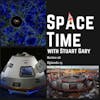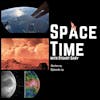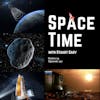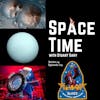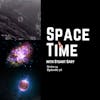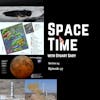59: Lunar water more common than thought

The world's premiere astronomy and space science news podcast
Thank you to our growing Patreon group. Your support is very much appreciated. You can help support SpaceTime too, by becoming a patron...and we have rewards for you. Do your bit to keep Stuart fed and housed... details at our Patreon page... https://www.patreon.com/spacetimewithstuartgary
Stream episodes on demand from www.bitesz.com (mobile friendly)
*Lunar water more common than thought There could be a lot more water on the Moon than previously thought. New Satellite readings indicate that numerous volcanic deposits spread across the lunar surface contain unusually high amounts of water compared with surrounding terrains. The findings mean there could be as much water in the lunar mantle was what there is in mantle basalts on Earth.
*Dark Matter more likely to be cold rather than fuzzy Scientists trying understand dark matter now believe it’s far more likely to be big and cold rather than light and fuzzy. The new findings are based on a study of the intergalactic medium – the stuff that fills the vast, largely empty space between galaxies.
*Countdown to Cassini's Grand Finale After nearly 13 years in orbit around Saturn, the international Cassini–Huygens mission is now reaching the end of its journey. Cassini’s final dramatic suicidal death plunge into Saturn's atmosphere will occur on September 15.
*Jupiter Great Red Spot in infrared As scientists continue to examine data from the recent Juno spacecraft flyby over Jupiter’s iconic Great Red Spot, astronomers have used the infrared imager on the Gemini North Telescope in Hawaii to study the solar system’s largest planet in a new light-- revealing particles over a range of different altitudes. The observations show the Great Red Spot is one of the highest-altitude features in Jupiter's atmosphere.
*The Science Report
Plastic pollution getting worse,
Some antibiotics taken during pregnancy linked to major congenital malformations in newborns,
Male fertility in wealthier nations has seen steep declines,
New technology may help analyze lung sounds in kids at risk of an asthma attack,
Permafrost melting due to climate change having a double impact,
Antidepressants taken during pregnancy linked to a slightly higher risk of autism,
Genetic differences between domesticated dogs and wolves which explain the canines' contrasting social interaction with humans.
Subscribe, rate and review SpaceTime at all good podcasting apps…including iTunes, Google Podcasts, Stitcher, Pocketcasts, Podbean, Radio Public, Tunein Radio, google play, etc.
Email: SpaceTime@bitesz.com
Join our mailing list at http://www.bitesz.com/join-our-mailing-list
#astronomy #space #science #technology #news #astrophysics #NASA
Learn more about your ad choices. Visit megaphone.fm/adchoices
Support this show http://supporter.acast.com/spacetime.
See acast.com/privacy for privacy and opt-out information.
The Astronomy, Space, Technology & Science News Podcast.
New to SpaceTime with Stuart Gary?
Here are some great episodes to start with.








































